外研版九年级下册Module 7 English for you and me Unit 3 课件 (共65张PPT)
文档属性
| 名称 | 外研版九年级下册Module 7 English for you and me Unit 3 课件 (共65张PPT) |

|
|
| 格式 | ppt | ||
| 文件大小 | 9.0MB | ||
| 资源类型 | 教案 | ||
| 版本资源 | 外研版 | ||
| 科目 | 英语 | ||
| 更新时间 | 2022-08-20 21:12:10 | ||
图片预览

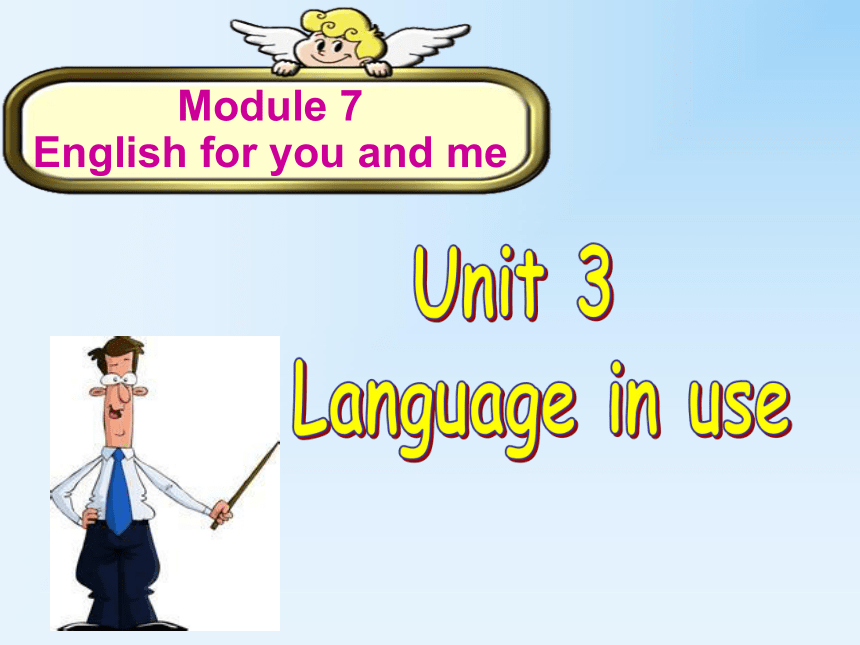
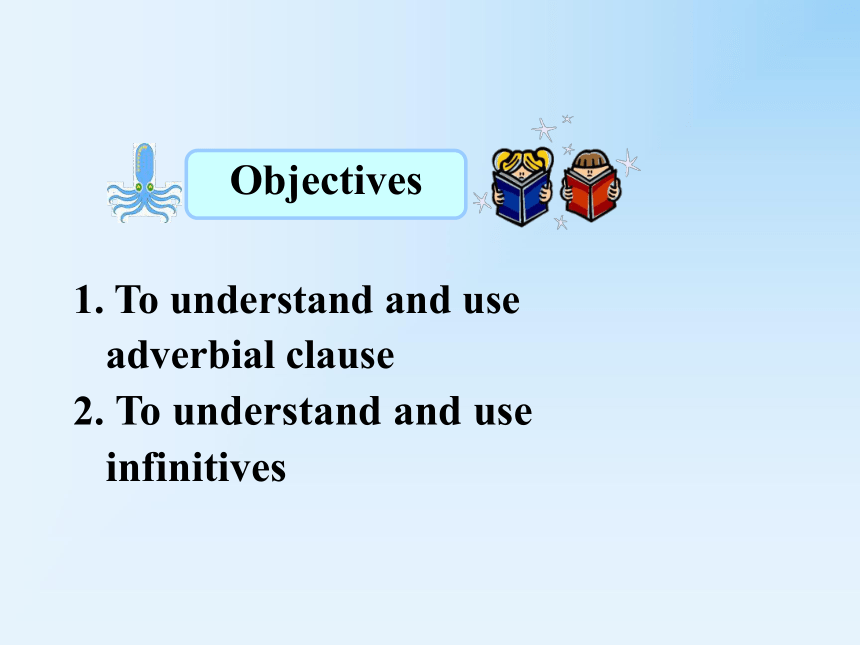

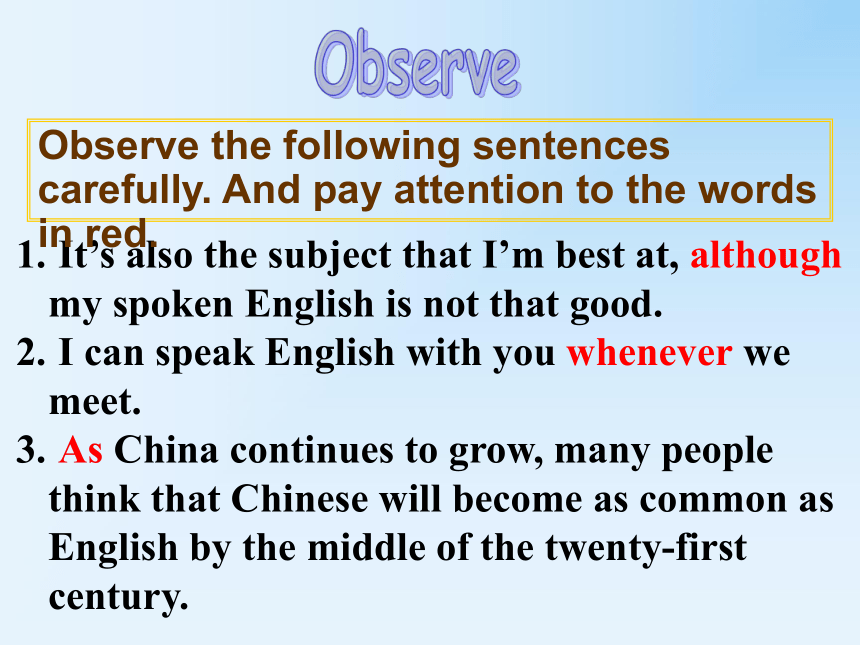

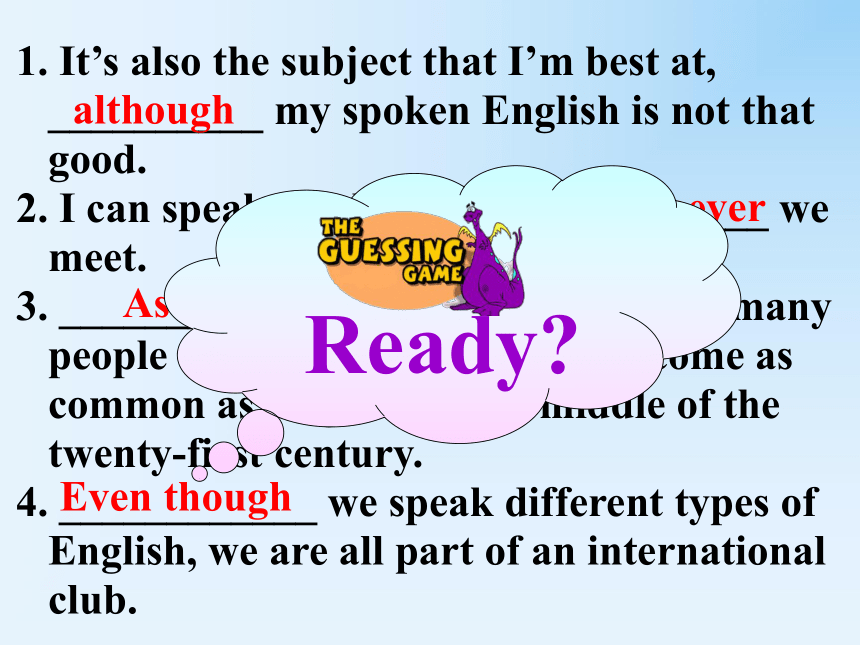
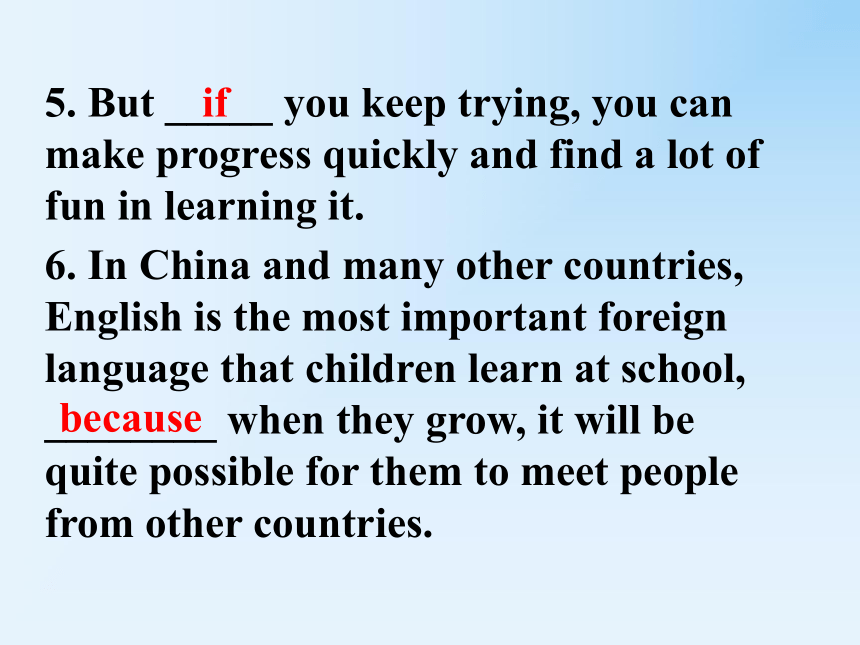

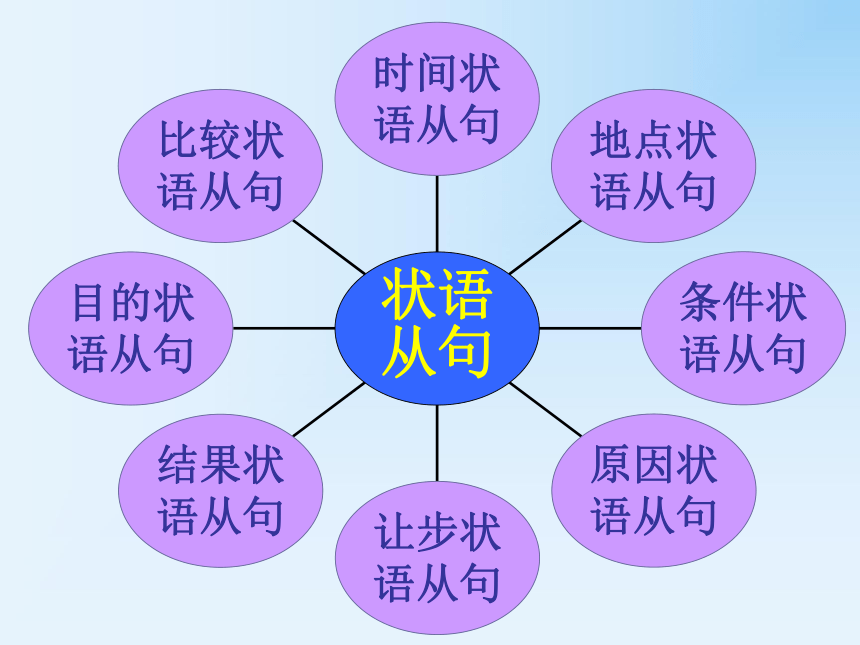
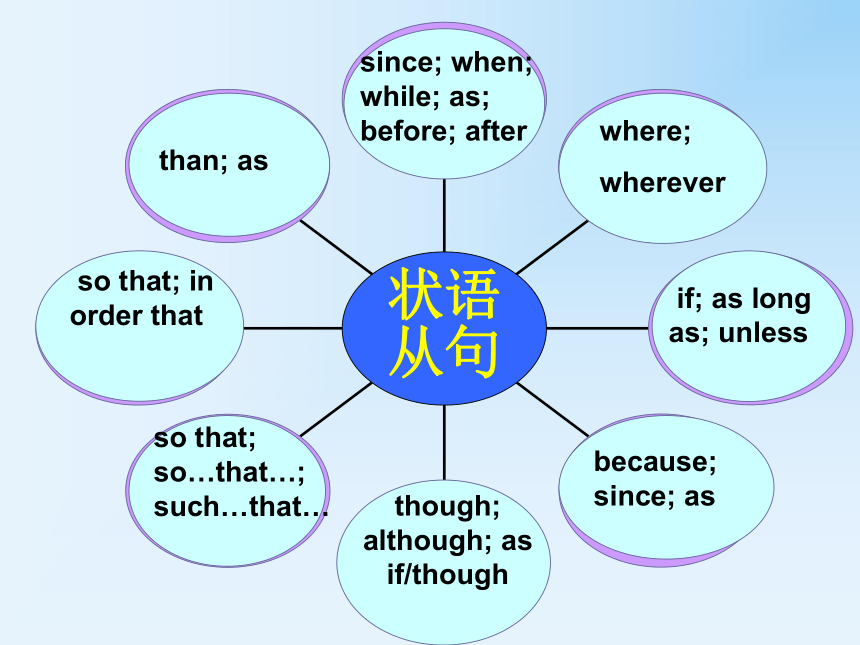

文档简介
(共65张PPT)
外研
九年级 下册
Module 7
English for you and me
Objectives
1. To understand and use adverbial clause
2. To understand and use infinitives
It’s also the subject that I’m best at, although my spoken English is not that good.
I can speak English with you whenever we meet.
As China continues to grow, many people think that Chinese will become as common as English by the middle of the twenty-first century.
Observe the following sentences carefully. And pay attention to the words in red.
4. Even though we speak different types of English, we are all part of an international club.
5. But if you keep trying, you can make progress quickly and find a lot of fun in learning it.
6. In China and many other countries, English is the most important foreign language that children learn at school, because when they grow, it will be quite possible for them to meet people from other countries.
It’s also the subject that I’m best at, __________ my spoken English is not that good.
I can speak English with you ________ we meet.
_________ China continues to grow, many people think that Chinese will become as common as English by the middle of the twenty-first century.
____________ we speak different types of English, we are all part of an international club.
although
whenever
As
go
Ready
Even though
5. But _____ you keep trying, you can make progress quickly and find a lot of fun in learning it.
6. In China and many other countries, English is the most important foreign language that children learn at school, ________ when they grow, it will be quite possible for them to meet people from other countries.
if
because
状语修饰动词、形容词、副词或整个句子。当状语为句子时即为状语从句,一般可以用来表示时间、地点、原因、结果等概念。
比较状
语从句
目的状
语从句
结果状
语从句
让步状
语从句
原因状
语从句
条件状
语从句
地点状
语从句
时间状
语从句
状语
从句
if; as long as; unless
so that; in order that
比较状
语从句
目的状
语从句
结果状
语从句
让步状
语从句
原因状
语从句
条件状
语从句
地点状
语从句
时间状
语从句
状语
从句
if; as long as; unless
so that; in order that
than; as
since; when; while; as; before; after
where;
wherever
if; as long as; unless
because; since; as
though; although; as if/though
so that; so…that…; such…that…
so that; in order that
时间状语从句 常用引导词:when, as, while, as soon as, while, before, after, since , till, until
I’ll write to you when I have finished the book.
我读完书就给你写信。
Let’s wait until/till the rain stops.
咱们等到雨停吧。
Tip 1:
在含有时间状语从句的主从复合句中,若主句用一般将来时,在after,as soon as,before,till,until和when等引导的时间状语从句常用一般现在时表将来。
I’ll tell her about the matter as soon as she returns home.
她一回家我就把这件事情告诉她。
Tip 2:
until/till引导时间状语从句,意为“直到……” 。当主句的谓语动词时延续性动词,主句常用肯定形式;当主句的谓语动词是短暂性动词时,主句常用否定形式。Not…until…意为“直到……才……”。
I’ll stay here until/till you come back.
我会呆在这里,直到你回来。
He didn’t go to bed until/till he finished his homework.
他直到做完作业才睡觉。
Tip 3:
since意为“自从……”,主句常用现在完成时,从句常用一般现在时。
(1)since后如果是短暂性动词的过去时,则时间的起点应该从动作发生时算起。
Mr. White has been here since he came back.
自从他回来以后,怀特先生一直在这儿。
(2)since后如果是延续性动词的过去时,则时间的起点应该从动作结束时算起。
He hasn’t been back to school since he was ill.
自从病愈以后,他一直没有回学校。
原因状语从句
常用引导词:because,since,as
Mark is absent today because he is ill.
马可今天没来,因为他病了。
As he was in a hurry, Jack left his bag home.
由于走的匆忙,杰克把包落在了家里。
地点状语从句
常用引导词:where,wherever
Where there is a will, there is a way.
有志者,事竟成。
Wherever you go, you should work hard.
无论你去哪儿,你都应该努力工作。
让步状语从句
常用引导词:though,although,even if/though
Even though you like it, I won’t buy it for you.
尽管你喜欢它,我还是不能 买给你。
Though she works hard, Sue failed in the exam.
尽管苏很努力,但她考试还是没及格。
结果状语从句
常用引导词:so(…)that…,such…that(so接形容词、副词;such接名词)
Gina opened the window so that fresh air came in.
吉娜把窗户打开,新鲜空气就进来了。
He was so selfish that nobody wanted to make friends with him.
他那么自私,没有人想和他交朋友。
It is such an nice weather that I’d like to take a walk.
天气如此好,我想去散步。
条件状语从句
常用引导词:if,as long as,unless,once
You may borrow this book as long as you keep it clean.
只要你不把这本书弄脏,你就可以借走它。
I’ll open the window if you don’t mind.
如果你不介意,我就打开窗户。
目的状语从句
常用引导词:so that,in order that(在目的状语从句中经常有情态动词)
She dressed like an angel so that everyone can notice her.
为了让所有人都注意到她,她穿得像个天使。
Tom ran very quickly so that he could catch up with Jack.
汤姆跑得很快,这样才能追上杰克。
比较状语从句
常用引导词:than,as
You sing better than he does.
你比他唱得好。
The story is as interesting as that one.
这个故事和那个故事一样有趣。
1. I hope I can continue to make progress next year.
2. The British, the Indians and the Chinese all help (to) make it a rich language.
3. It is also important to know that English has borrowed many words from other countries.
4. Some people think English is too difficult and it requires too much effort to learn it well.
Observe the following sentences carefully. And pay attention to the words in red.
5. You mean those clubs where people go to practise their English
6. I’m always happy to speak to you in English.
7. In China and many other countries, English is the most important foreign language that children learn at school, because when they grow, it will be quite possible for them to meet people from other countries.
1. I hope I can continue ________ (make) progress next year.
2. The British, the Indians and the Chinese all help ________ (make) it a rich language.
3. It is also important _________ (know) that English has borrowed many words from other countries.
4. Some people think English is too difficult and it requires too much effort ________ (learn) it well.
to make
(to) make
go
Ready
to know
to learn
5. You mean those clubs where people go _____________ (practise) their English
6. I’m always happy _________ (speak) to you in English.
7. In China and many other countries, English is the most important foreign language that children learn at school, because when they grow, it will be quite possible for them _________ (meet) people from other countries.
to practise
to speak
to meet
当句子中已经有谓语动词,而我们又要
表达不止一个动作概念时,其余的动词
可以使用非谓语形式表达。非谓语动词包括动词不定式、分词和动名词。
下面着重学习课标要求掌握的非谓语动词——动词不定式。
Kitty is preparing to go out next
Sunday.
Kitty plans to take Linda out.
Linda wanted to visit the park.
Sandy agrees to go with them.
Millie decided to stay at home.
Please go on to look at the sentences below. Pay attention to the colored words.
上面例子中主要行为动词后面的动词
都采用了“to + 动词原形”的结构,即动
词不定式(有时可不带to)。
什么是动词不定式(‘to-infinitives’)?
动词不定式可在句中作主语、宾语、表语、宾语补足语、定语和状语。
它没有人称和数的变化,其结构为“to + 动词原形”,否定形式为“not to +动词原形”。
动词不定式
初中阶段主要考察动词不定式在句中作宾语、宾语补足语和目的状语。
动词不定式作宾语
He wants to buy some vegetables.
他想要买些蔬菜。
plan, want, hope, decide等动词,一般只能用动词不定式作宾语,表示:
“计划、想要、决定、打算做某事”。
We often use to-infinitives after these verbs.
agree choose decide hope
learn plan prepare want
like start begin fail
wish try remember forget
动词不定式作宾语补足语
My mum asks me to play the piano
two hours every day.
我妈妈让我每天弹两小时的钢琴。
我们常说的不定式作宾语补足语是指 v. +名词/代词+ (to) do sth. 结构中的不定式。动词不定式可以用来说明宾语的情况。
The teacher told me to clean the blackboard.
I want you to give me some help.
常带不定式作宾补的动词:
warn, tell, allow, ask, order, get,
invite, wish, want, encourage等
+ sb. to do sth.
notice
listen to
hear
watch
五看
see
look at
observe
三使
let
make
have
二听
一感觉:
feel
+ sb. do sth.
(不带to)
She often helps me (to) do the housework.
她常常帮我做家务。
We helped him (to) fix his bike.
我们帮他修自行车。
动词help后面的动词不定式可带to,也可不带to。
动词不定式作目的状语
动词不定式用作目的状语,表示某一动作或状态的目的。(做某事是为了什么)
I had to work hard to earn money.
我不得不努力工作赚钱。
He stayed at home to finish his homework.
他留在家完成作业。
由in order to引导的目的状语,既可以置于句尾,也可以置于句首。
They started early in order to get there in time. = In order to get there in time, they started early.
为了及时赶到那里,他们很早就出发了。
不定式前面加in order构成in order to do …可加强语气或使目的意义更加清楚。
She is running quickly in order to catch the train.
为了赶火车,她正飞快地跑着。
以下部分为课本练习,供老师在对答案时选择使用。
after although because before if so that so ... that ... when while
1. Many Confucius Institutes have been set up around the world _________ more and more people want to learn Chinese.
2. French was more popular ________ English became important in the nineteenth century.
3. I will make great progress _____ you help me learn English.
because
before
if
Complete the sentences with the words or expressions in the box. There may be more than one answer.
1
P60
4. Tony finds writing Chinese really difficult, ________ he can understand and speak Chinese pretty well.
5. English spread more quickly all over the world _______ television was invented.
6. I advise you to go to an English corner __________ you can improve your listening and speaking.
although
after
so that
after although because before if so that so ... that ... when while
7. English has become ________ important
in international communication ________ schools in China and many other countries teach the language.
8. In order to improve his English, my uncle took every chance to talk to people in Australia ___________ he was working there.
9. I started learning English ________ I was seven years old, right on my birthday.
when/while
when
that
so
after although because before if so that so ... that ... when while
Complete the sentences with the correct form of
the words in brackets.
1. Many people want ________ (study) English so they can get a good job.
2. I asked my teacher ______ (give) me some extra English homework.
3. You need _________ (practise) speaking every day if you want to improve your spoken English.
4. Jenny learnt ________ (speak) English well while she was in Canada.
5. English is easy ________ (learn) if you practise and revise every day.
to study
to give
(to) practise
to speak
to learn
2
P60
Work in pairs. Read the remarks and discuss the questions.
3
P61
1. Who has done very well at school
Meg has done very well at school.
2. What does Ned need to do in order to get better at handwriting
Ned needs to practise for a few minutes
every day.
3. What does Toby enjoy Does he like schoolwork as much as this, or less than this
Toby enjoys sport. He likes schoolwork less than sport.
requires
(to) practise
improve
to achieve
written
(to) spread
spoken
Complete the conversation with the correct form of the words in brackets.
4
P61
1. In the past, people living in ____ spoke English.
all of Britain c) all of France
a part of Britain d) most of the world
2. English is a world language because ____.
five billion people speak it
many people are learning it
people stopped speaking Latin
speakers of many different language use it
Read the passage and choose the correct answer.
5
P62
3. People find it difficult to imagine that ___.
French was more important than English
English will always be important
English might be less important in future
Latin was used as a common language for many centuries
4. Many people today are learning _____.
Chinese, Spanish or French
Chinese, Latin or English
Chinese, English or Latin
Chinese, Spanish or Arabic
Listen and decide what the passage is about.
a) An English learning website
b) An English magazine
c) An English language teacher
6
P63
Listen again and answer the questions.
1. What can most students easily find to practise their English
2. What has been developed to help students
get the practice they need
3. Why can students get a lot of speaking
practice
4. Do student need to use an Internet
program, if they want to join the course
They can easily find books, CDs and online courses to practise their English.
A website called Now talk! has been
developed.
Yes, they need to use Skype if they want to join the course.
They get a lot of speaking practice because there are only four students for one teacher.
7
P63
Tapescript:
1
2
3
4
3. Is Esperanto likely to become a world language
Because they hoped to invent a world language that can ease human communication.
1. Why have people been inventing languages since the twelfth century
2. Who invented Esperanto
A polish man called Zamenhof.
No, it isn’t.
Read and answer the questions.
P63
1. 状语从句及引导词 when, before, after, until, as soon as, as, while, if, where, wherever, because, as, since, so that, that, in order that, although, though, than, as, so…that…, such…that…
2. 动词不定式可在句中作主语、宾语、表语、宾语补足语、定语和状语。
Ⅰ. 根据句意填入适当的连词完成句子。 1. Mum was sweeping the floor ________ I was doing my homework. 2. ________ you go there on foot, you will be late for the meeting. 3. _________ it was very cold outside, he didn’t wear his jacket. 4. The actor performs much better ________ he did last year.
while/when
If
Though/ Although
than
5. Dad has got into the habit of drinking a glass of milk ________ he goes to bed every day. 6. Mr Gao asked me to wait ________ the rain stopped. 7. Mr Black has taught us Chinese _________ he came to our school. 8. Ned didn’t hand in his homework _________ Mr Wang was mad.
before
until
since
so
Ⅱ . 句型转换。 1. Alice is not only bright but also hard-working. (对划线部分提问) ________ ________ Alice ________ 2. Toby ran fast to catch up with Maria. (改为同义句) Toby ran fast _______ _______ ________ catch up with Maria. 3. Li Lei got high marks in Chinese. (改为否定句) Li Lei _______ ________ high marks in Chinese.
What is like
in order to
didn’t get
4. Some Confucius Institutes are founded every year. (改为同义句) Some Confucius Institutes are ________ ________ every year. 5. Miss White advises Susie to pay more attention to her spelling. (对划线部分提问) _______ _______ Miss White ________ Susie to pay more attention to
set
up
What does advise
1. My parents didn’t allow me _____ to the party. (2015天津)
A. go B. to go C. goes D. went
2. — So beautiful flowers! I can’t decide _____ for my mom. — For Mother’s Day, it can’t be better to take some carnations(康乃馨).
(2015福州)
A. when to choose B. which to choose
C. how to choose
3. When you leave, please turn off the lights _____ energy. (2015泰安)
A. save B. to save
C. saving D. saved
4. I was tired out, so I stopped the car _____ a short rest. (2015苏州)
A. have B. having
C. to have D. had
5.We are too tired. Let’s stop _____ a rest. (2015益阳)
A. to have B. have C. having
6. I really don’t know _____ this question. It is too hard. (2015自贡)
A. which to answer B. how to answer
C. what to answer
7. The joke was so funny that it made him _____ again and again. (2015重庆B卷)
A. laugh B. to laugh
C. laughed D. laughs
8.We stopped _____, but there was not any sound. (2015四川资阳)
A. to listen B. listens
C. listen D. listening
9.-Mum, _____ shall we have lunch -We will have it when your dad _____.
(2015安顺)
A. when; returns B. where; will return
C. where; returns D. when; will return
10. -Would you please give this newly-published novel to Jack -Certainly. _____ he comes back.
(2015泰安)
A. before B. as soon as
C. until D. unless
11. It is _____ a beautiful garden _____ we like to play in it.
(2015四川宜宾)
A. so; that
B. such; that
C. too; to
D. very; that
1. Finish the exercises in Learning English.
2. Preview the words and expressions in Module 8.
Homework
外研
九年级 下册
Module 7
English for you and me
Objectives
1. To understand and use adverbial clause
2. To understand and use infinitives
It’s also the subject that I’m best at, although my spoken English is not that good.
I can speak English with you whenever we meet.
As China continues to grow, many people think that Chinese will become as common as English by the middle of the twenty-first century.
Observe the following sentences carefully. And pay attention to the words in red.
4. Even though we speak different types of English, we are all part of an international club.
5. But if you keep trying, you can make progress quickly and find a lot of fun in learning it.
6. In China and many other countries, English is the most important foreign language that children learn at school, because when they grow, it will be quite possible for them to meet people from other countries.
It’s also the subject that I’m best at, __________ my spoken English is not that good.
I can speak English with you ________ we meet.
_________ China continues to grow, many people think that Chinese will become as common as English by the middle of the twenty-first century.
____________ we speak different types of English, we are all part of an international club.
although
whenever
As
go
Ready
Even though
5. But _____ you keep trying, you can make progress quickly and find a lot of fun in learning it.
6. In China and many other countries, English is the most important foreign language that children learn at school, ________ when they grow, it will be quite possible for them to meet people from other countries.
if
because
状语修饰动词、形容词、副词或整个句子。当状语为句子时即为状语从句,一般可以用来表示时间、地点、原因、结果等概念。
比较状
语从句
目的状
语从句
结果状
语从句
让步状
语从句
原因状
语从句
条件状
语从句
地点状
语从句
时间状
语从句
状语
从句
if; as long as; unless
so that; in order that
比较状
语从句
目的状
语从句
结果状
语从句
让步状
语从句
原因状
语从句
条件状
语从句
地点状
语从句
时间状
语从句
状语
从句
if; as long as; unless
so that; in order that
than; as
since; when; while; as; before; after
where;
wherever
if; as long as; unless
because; since; as
though; although; as if/though
so that; so…that…; such…that…
so that; in order that
时间状语从句 常用引导词:when, as, while, as soon as, while, before, after, since , till, until
I’ll write to you when I have finished the book.
我读完书就给你写信。
Let’s wait until/till the rain stops.
咱们等到雨停吧。
Tip 1:
在含有时间状语从句的主从复合句中,若主句用一般将来时,在after,as soon as,before,till,until和when等引导的时间状语从句常用一般现在时表将来。
I’ll tell her about the matter as soon as she returns home.
她一回家我就把这件事情告诉她。
Tip 2:
until/till引导时间状语从句,意为“直到……” 。当主句的谓语动词时延续性动词,主句常用肯定形式;当主句的谓语动词是短暂性动词时,主句常用否定形式。Not…until…意为“直到……才……”。
I’ll stay here until/till you come back.
我会呆在这里,直到你回来。
He didn’t go to bed until/till he finished his homework.
他直到做完作业才睡觉。
Tip 3:
since意为“自从……”,主句常用现在完成时,从句常用一般现在时。
(1)since后如果是短暂性动词的过去时,则时间的起点应该从动作发生时算起。
Mr. White has been here since he came back.
自从他回来以后,怀特先生一直在这儿。
(2)since后如果是延续性动词的过去时,则时间的起点应该从动作结束时算起。
He hasn’t been back to school since he was ill.
自从病愈以后,他一直没有回学校。
原因状语从句
常用引导词:because,since,as
Mark is absent today because he is ill.
马可今天没来,因为他病了。
As he was in a hurry, Jack left his bag home.
由于走的匆忙,杰克把包落在了家里。
地点状语从句
常用引导词:where,wherever
Where there is a will, there is a way.
有志者,事竟成。
Wherever you go, you should work hard.
无论你去哪儿,你都应该努力工作。
让步状语从句
常用引导词:though,although,even if/though
Even though you like it, I won’t buy it for you.
尽管你喜欢它,我还是不能 买给你。
Though she works hard, Sue failed in the exam.
尽管苏很努力,但她考试还是没及格。
结果状语从句
常用引导词:so(…)that…,such…that(so接形容词、副词;such接名词)
Gina opened the window so that fresh air came in.
吉娜把窗户打开,新鲜空气就进来了。
He was so selfish that nobody wanted to make friends with him.
他那么自私,没有人想和他交朋友。
It is such an nice weather that I’d like to take a walk.
天气如此好,我想去散步。
条件状语从句
常用引导词:if,as long as,unless,once
You may borrow this book as long as you keep it clean.
只要你不把这本书弄脏,你就可以借走它。
I’ll open the window if you don’t mind.
如果你不介意,我就打开窗户。
目的状语从句
常用引导词:so that,in order that(在目的状语从句中经常有情态动词)
She dressed like an angel so that everyone can notice her.
为了让所有人都注意到她,她穿得像个天使。
Tom ran very quickly so that he could catch up with Jack.
汤姆跑得很快,这样才能追上杰克。
比较状语从句
常用引导词:than,as
You sing better than he does.
你比他唱得好。
The story is as interesting as that one.
这个故事和那个故事一样有趣。
1. I hope I can continue to make progress next year.
2. The British, the Indians and the Chinese all help (to) make it a rich language.
3. It is also important to know that English has borrowed many words from other countries.
4. Some people think English is too difficult and it requires too much effort to learn it well.
Observe the following sentences carefully. And pay attention to the words in red.
5. You mean those clubs where people go to practise their English
6. I’m always happy to speak to you in English.
7. In China and many other countries, English is the most important foreign language that children learn at school, because when they grow, it will be quite possible for them to meet people from other countries.
1. I hope I can continue ________ (make) progress next year.
2. The British, the Indians and the Chinese all help ________ (make) it a rich language.
3. It is also important _________ (know) that English has borrowed many words from other countries.
4. Some people think English is too difficult and it requires too much effort ________ (learn) it well.
to make
(to) make
go
Ready
to know
to learn
5. You mean those clubs where people go _____________ (practise) their English
6. I’m always happy _________ (speak) to you in English.
7. In China and many other countries, English is the most important foreign language that children learn at school, because when they grow, it will be quite possible for them _________ (meet) people from other countries.
to practise
to speak
to meet
当句子中已经有谓语动词,而我们又要
表达不止一个动作概念时,其余的动词
可以使用非谓语形式表达。非谓语动词包括动词不定式、分词和动名词。
下面着重学习课标要求掌握的非谓语动词——动词不定式。
Kitty is preparing to go out next
Sunday.
Kitty plans to take Linda out.
Linda wanted to visit the park.
Sandy agrees to go with them.
Millie decided to stay at home.
Please go on to look at the sentences below. Pay attention to the colored words.
上面例子中主要行为动词后面的动词
都采用了“to + 动词原形”的结构,即动
词不定式(有时可不带to)。
什么是动词不定式(‘to-infinitives’)?
动词不定式可在句中作主语、宾语、表语、宾语补足语、定语和状语。
它没有人称和数的变化,其结构为“to + 动词原形”,否定形式为“not to +动词原形”。
动词不定式
初中阶段主要考察动词不定式在句中作宾语、宾语补足语和目的状语。
动词不定式作宾语
He wants to buy some vegetables.
他想要买些蔬菜。
plan, want, hope, decide等动词,一般只能用动词不定式作宾语,表示:
“计划、想要、决定、打算做某事”。
We often use to-infinitives after these verbs.
agree choose decide hope
learn plan prepare want
like start begin fail
wish try remember forget
动词不定式作宾语补足语
My mum asks me to play the piano
two hours every day.
我妈妈让我每天弹两小时的钢琴。
我们常说的不定式作宾语补足语是指 v. +名词/代词+ (to) do sth. 结构中的不定式。动词不定式可以用来说明宾语的情况。
The teacher told me to clean the blackboard.
I want you to give me some help.
常带不定式作宾补的动词:
warn, tell, allow, ask, order, get,
invite, wish, want, encourage等
+ sb. to do sth.
notice
listen to
hear
watch
五看
see
look at
observe
三使
let
make
have
二听
一感觉:
feel
+ sb. do sth.
(不带to)
She often helps me (to) do the housework.
她常常帮我做家务。
We helped him (to) fix his bike.
我们帮他修自行车。
动词help后面的动词不定式可带to,也可不带to。
动词不定式作目的状语
动词不定式用作目的状语,表示某一动作或状态的目的。(做某事是为了什么)
I had to work hard to earn money.
我不得不努力工作赚钱。
He stayed at home to finish his homework.
他留在家完成作业。
由in order to引导的目的状语,既可以置于句尾,也可以置于句首。
They started early in order to get there in time. = In order to get there in time, they started early.
为了及时赶到那里,他们很早就出发了。
不定式前面加in order构成in order to do …可加强语气或使目的意义更加清楚。
She is running quickly in order to catch the train.
为了赶火车,她正飞快地跑着。
以下部分为课本练习,供老师在对答案时选择使用。
after although because before if so that so ... that ... when while
1. Many Confucius Institutes have been set up around the world _________ more and more people want to learn Chinese.
2. French was more popular ________ English became important in the nineteenth century.
3. I will make great progress _____ you help me learn English.
because
before
if
Complete the sentences with the words or expressions in the box. There may be more than one answer.
1
P60
4. Tony finds writing Chinese really difficult, ________ he can understand and speak Chinese pretty well.
5. English spread more quickly all over the world _______ television was invented.
6. I advise you to go to an English corner __________ you can improve your listening and speaking.
although
after
so that
after although because before if so that so ... that ... when while
7. English has become ________ important
in international communication ________ schools in China and many other countries teach the language.
8. In order to improve his English, my uncle took every chance to talk to people in Australia ___________ he was working there.
9. I started learning English ________ I was seven years old, right on my birthday.
when/while
when
that
so
after although because before if so that so ... that ... when while
Complete the sentences with the correct form of
the words in brackets.
1. Many people want ________ (study) English so they can get a good job.
2. I asked my teacher ______ (give) me some extra English homework.
3. You need _________ (practise) speaking every day if you want to improve your spoken English.
4. Jenny learnt ________ (speak) English well while she was in Canada.
5. English is easy ________ (learn) if you practise and revise every day.
to study
to give
(to) practise
to speak
to learn
2
P60
Work in pairs. Read the remarks and discuss the questions.
3
P61
1. Who has done very well at school
Meg has done very well at school.
2. What does Ned need to do in order to get better at handwriting
Ned needs to practise for a few minutes
every day.
3. What does Toby enjoy Does he like schoolwork as much as this, or less than this
Toby enjoys sport. He likes schoolwork less than sport.
requires
(to) practise
improve
to achieve
written
(to) spread
spoken
Complete the conversation with the correct form of the words in brackets.
4
P61
1. In the past, people living in ____ spoke English.
all of Britain c) all of France
a part of Britain d) most of the world
2. English is a world language because ____.
five billion people speak it
many people are learning it
people stopped speaking Latin
speakers of many different language use it
Read the passage and choose the correct answer.
5
P62
3. People find it difficult to imagine that ___.
French was more important than English
English will always be important
English might be less important in future
Latin was used as a common language for many centuries
4. Many people today are learning _____.
Chinese, Spanish or French
Chinese, Latin or English
Chinese, English or Latin
Chinese, Spanish or Arabic
Listen and decide what the passage is about.
a) An English learning website
b) An English magazine
c) An English language teacher
6
P63
Listen again and answer the questions.
1. What can most students easily find to practise their English
2. What has been developed to help students
get the practice they need
3. Why can students get a lot of speaking
practice
4. Do student need to use an Internet
program, if they want to join the course
They can easily find books, CDs and online courses to practise their English.
A website called Now talk! has been
developed.
Yes, they need to use Skype if they want to join the course.
They get a lot of speaking practice because there are only four students for one teacher.
7
P63
Tapescript:
1
2
3
4
3. Is Esperanto likely to become a world language
Because they hoped to invent a world language that can ease human communication.
1. Why have people been inventing languages since the twelfth century
2. Who invented Esperanto
A polish man called Zamenhof.
No, it isn’t.
Read and answer the questions.
P63
1. 状语从句及引导词 when, before, after, until, as soon as, as, while, if, where, wherever, because, as, since, so that, that, in order that, although, though, than, as, so…that…, such…that…
2. 动词不定式可在句中作主语、宾语、表语、宾语补足语、定语和状语。
Ⅰ. 根据句意填入适当的连词完成句子。 1. Mum was sweeping the floor ________ I was doing my homework. 2. ________ you go there on foot, you will be late for the meeting. 3. _________ it was very cold outside, he didn’t wear his jacket. 4. The actor performs much better ________ he did last year.
while/when
If
Though/ Although
than
5. Dad has got into the habit of drinking a glass of milk ________ he goes to bed every day. 6. Mr Gao asked me to wait ________ the rain stopped. 7. Mr Black has taught us Chinese _________ he came to our school. 8. Ned didn’t hand in his homework _________ Mr Wang was mad.
before
until
since
so
Ⅱ . 句型转换。 1. Alice is not only bright but also hard-working. (对划线部分提问) ________ ________ Alice ________ 2. Toby ran fast to catch up with Maria. (改为同义句) Toby ran fast _______ _______ ________ catch up with Maria. 3. Li Lei got high marks in Chinese. (改为否定句) Li Lei _______ ________ high marks in Chinese.
What is like
in order to
didn’t get
4. Some Confucius Institutes are founded every year. (改为同义句) Some Confucius Institutes are ________ ________ every year. 5. Miss White advises Susie to pay more attention to her spelling. (对划线部分提问) _______ _______ Miss White ________ Susie to pay more attention to
set
up
What does advise
1. My parents didn’t allow me _____ to the party. (2015天津)
A. go B. to go C. goes D. went
2. — So beautiful flowers! I can’t decide _____ for my mom. — For Mother’s Day, it can’t be better to take some carnations(康乃馨).
(2015福州)
A. when to choose B. which to choose
C. how to choose
3. When you leave, please turn off the lights _____ energy. (2015泰安)
A. save B. to save
C. saving D. saved
4. I was tired out, so I stopped the car _____ a short rest. (2015苏州)
A. have B. having
C. to have D. had
5.We are too tired. Let’s stop _____ a rest. (2015益阳)
A. to have B. have C. having
6. I really don’t know _____ this question. It is too hard. (2015自贡)
A. which to answer B. how to answer
C. what to answer
7. The joke was so funny that it made him _____ again and again. (2015重庆B卷)
A. laugh B. to laugh
C. laughed D. laughs
8.We stopped _____, but there was not any sound. (2015四川资阳)
A. to listen B. listens
C. listen D. listening
9.-Mum, _____ shall we have lunch -We will have it when your dad _____.
(2015安顺)
A. when; returns B. where; will return
C. where; returns D. when; will return
10. -Would you please give this newly-published novel to Jack -Certainly. _____ he comes back.
(2015泰安)
A. before B. as soon as
C. until D. unless
11. It is _____ a beautiful garden _____ we like to play in it.
(2015四川宜宾)
A. so; that
B. such; that
C. too; to
D. very; that
1. Finish the exercises in Learning English.
2. Preview the words and expressions in Module 8.
Homework
同课章节目录
- Module 1 Travel
- Unit 1 We toured the city by bus and by taxi
- Unit 2 It's a long story.
- Unit 3 Language in use
- Module 2 Education
- Unit 1 They don't sit in rows.
- Unit 2 What do I like best about school?
- Unit 3 Language in use
- Module 3 Life now and then
- Unit 1 They sometimes work harder.
- Unit 2 I think life is better today.
- Unit 3 Language in use.
- Module 4 Rules and suggestions
- Unit 1 You must be careful of falling stones.
- Unit 2 we must keep the camp clean.
- Unit 3 Language in use.
- Revison A
- Module 5 Look after yourself
- Unit 1 We'd better get you to hospital.
- Unit 2 Get off the sofa!
- Unit 3 Language in use.
- Module 6 Eating togethe
- Unit 1 When is the school-leavers' party?
- Unit 2 Knives and forks are used for most Western
- Unit 3 Language in use
- Module 7 English for you and me
- Unit 1 Have you ever been to an English corner?
- Unit 2 We all own English.
- Unit 3 Language in use
- Module 8 My future life
- Unit 1 Here's to our friendship and the future
- Unit 2 I know that you will be better at maths.
- Unit 3 Language in use
- Revison B
